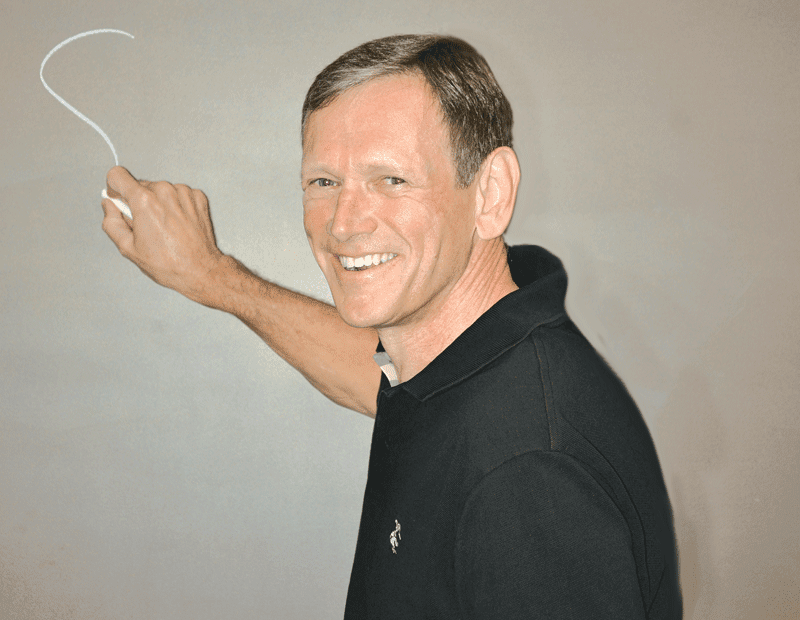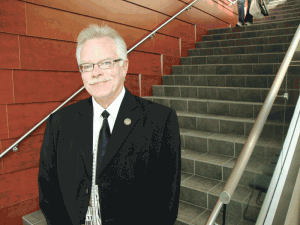
A Green Report Card
Initiatives Strive for Success Far Beyond the Classroom
As the chief coordinator of Greenfield Community College’s Renewable Energy/ Energy Efficiency Program, Teresa Jones told BusinessWest that these are exciting times to be in higher education.Speaking to the ‘community’ component of her school, where she is also an associate professor, Jones said that “our economy in Greenfield and the surrounding area is a step ahead of many other areas with regard to sustainability and green thinking.
“But as an educator,” she continued, “I think the question I always go back to is, how does a community college contribute to job growth and economic development?”
GCC is one of the Pioneer Valley’s green beacons in developing student programs that strive for a role not just in the evolving green economy, but also in the much-needed pragmatism of job creation.
UMass Amherst has embraced sustainability on all levels, from the administration to the student body. The university has set a goal to become carbon-neutral by the year 2050, and over the last decade has reduced greenhouse-gas emissions by 30%. Within the academic departments, a notable example is the Green Building program in the Department of Environmental Conservation, which has been actively involved with students and the region’s construction sector.
At the Isenberg School of Management, Bill Woolridge is the chair of the Management Department, and he told BusinessWest how the class he teaches has evolved over the years to become more attuned to the changing priorities of green consciousness.
He carefully stressed the Amherst campus’s thorough approach to sustainability. But his department is aware of what he called “the bigger picture.”
“In most schools’ management curriculum,” he explained, “there’s that course that speaks to the role of business in the broader social environment.
“I hadn’t taught that in quite a while,” he went on, “and about six years ago decided that I would. As I started to become reacquainted with that material, I realized that addressing sustainable issues is really the challenge of the current generation of students.”

Keith Hensley says green-business programs, at their most effective, will drive job opportunities in the regional economy.
HCC has partnered with two organizations to broaden the school’s certificate and training programs within a green economy — with both real-time results for jobs in the marketplace and opportunities for businesses to embrace sustainable practices that also help the bottom line.
For this article, BusinessWest asked people within these schools to explain their own green report cards. Jones was speaking of her own school specifically, but could just as easily been including the goals of her colleagues at other colleges, when she noted that “GCC, above all, serves as a convener for the community. We bring together diverse interests, talents, energies, concerns, ideas, and insights.” It’s that type of thinking that’s making this green curriculum as successful in the job market as it is in the classroom.
Certifiably Green
Hensley said that HCC’s current roster of green programs took root a few years back.
“About two years ago, we partnered with the Hampden County Regional Employment Board,” he explained. “They had applied for a workforce grant from the state for energy conservation — for certain types of training, such as weatherization and insulation, solar-boiler technician training, and energy-auditor training.”
The projected outcomes for the grant were job placements, he said. While the school charted the most success of any institution in the Commonwealth also receiving those funds, “it still wasn’t as much as I would have liked to see.
“What that told us, when everything shook out, is that there currently are not enough jobs in those particular occupations in the state,” he said. “And what we did was take a look at the entire sustainable, energy-efficiency, renewable-energy field as it stands right now, and we homed in on a few things.”
The Green Communities Program, from the state’s Department of Energy and Environmental Affairs, strives for signatory cities and towns to reduce their overall carbon footprint. Among 72 others, Holyoke and Springfield have signed on. Hensley cited that legislation, as well as an overall environmentally minded population in the Pioneer Valley, as two factors in HCC’s redesign of its green programming.
“And we also looked at the economy as it stands right now,” he said. “Unlike other parts of the country, our manufacturing base is still there. So, with decreased product demand that comes from a bad economy, it’s pushing manufacturing employers to think innovatively, figure out how they can cut costs.”
To meet these needs, HCC has forged partnerships with two organizations: HospitalityGreen LLC, a New York-based consulting firm, and the Energy Conservation Training Co., which specializes in numerous aspects of professional training and certification.
With HospitalityGreen, there are four short yet intensive courses: “Green Facilities Training for Managers,” “Introduction to Green Purchasing,” “Getting to Sustainability Through Changes in Waste Contracting,” and a “Green Custodial and Janitorial” course.
“Participants get a ton of online tools when they go back to their own facilities,” Hensley added. “And we also advise them on how to approach owners and managers of the company, to get their suggestions through.”
Also with HospitalityGreen are two full-day classes for the restaurant and hospitality industries. A core of information will tell participants what it means to be green, and how sustainability affects business.
“The attendees from the companies will get a few days of training, and they go back out to their employers and start doing their audit,” he said. “The bottom line here is to save the businesses money, but also to get a designation as a green restaurant or a green hotel. That has huge implications, especially in this area, where people are environmentally conscious.”
With ECONTC, Holyoke Community College has implemented a series of courses for the building trades. Using metrics set by the Building Performance Institute, a national organization for energy-efficient standards, the classes include “BPI Building Analyst/Envelope Training,” “BPI Heating Professional Training and Certification,” and “Residential Energy Services Network and Home Energy Rating Systems Rater Training and Certification.”
“For all this new programming,” Hensley said, “our mission is twofold. It’s to help companies save money, or make more money, in the case of green-lodging and green-restaurant certification. We expect that those companies who get certified will get more business. And on the other hand, it’s to help companies and homeowners who will be impacted by these trained people, to be included in what it means to be a green community in this region.”
Talkin’ ’bout an Evolution
Back in the 1970s, Woolridge said, when he was the age of his students now, environmental issues were an academic niche in business schools.
“We would talk about EPA rules and so forth,” he said. “It was seen as a compliance issue — an obligation. One of the costs of doing business was to adhere to these government strictures. But that has all moved to the front burner. It’s something we can’t put off anymore.”
Meanwhile, the class he has been teaching is constantly evolving. “The way I teach the course, and the way many others around the country do, is that it’s more an opportunity than an obligation,” he explained. “This is a challenge for this generation and the next generation of business leaders as to what is going to fuel economic growth over the next decades — solving our social and environmental problems on a global scale.”
When asked the name of the class, Woolridge laughed. “Even that’s in flux. It has officially this year been called ‘Social Responsibility and Sustainability.’ This semester on the syllabus, I’m tweaking it, though, looking for the right label. Some of us are calling this ‘Sustainable Enterprise.’
“It has some historic analysis,” he explained, “but it has more of what I would call an examination of sustainable business practices. We use something known as the Socrates database that has 2,500 large businesses profiled, and they have done pretty comprehensive analysis in many areas, particularly with regard to the natural environment, social issues, their governing structures, and so forth. So we look there to get a sense of how industries are doing, relative to these dimensions, and how specific businesses within those industries are doing.
The other important component in the class is to identify the business opportunities presented by these challenges, he added. “This is the challenge for the next generation of business leaders.”
Ideally, Woolridge envisions a certificate program in the undergraduate Business school for Sustainable Practices. “Fairly soon,” he said. “Maybe at the beginning of the next academic year.”
Add to that a class in social entrepreneurship. “This concept is generally about creating new enterprises to solve social issues. Overall, our goal here is to give students perspective, skills, and, for those students going on to small business or entrepreneurship, a sense of the opportunities that do exist.”
UMass Amherst has the critical mass of demand for classes in this field, he said, and a labor market which will support this in future job placements. “It’s impossible to quantify in any real numbers,” he said, “but I know, if we build it, they will come.”
Community Action Plan
An important aspect of GCC’s green classwork translating into actual jobs, Jones said, is that those same employers were part of the original team helping to create the program.
The RE/EE Program at GCC originally started as a $372,000 Workforce Competitive Trust Fund grant, in partnership with the Franklin/Hampshire Regional Employment Board. However, more than 40 regional organizations, from nonprofits to small businesses, also collaborated on the course design for certificate and degree programs.
“The businesses know the program intimately, but also the people that are coming through it,” she explained. “My husband is a small-business owner, and I know for a fact that this is absolutely critical. Here, a business knows who they’re getting, what they know academically, and what their capacities are. A lot of businesses in our area are pretty small, so in the hiring of even one employee, you want to make sure that the match is pretty good.”
Jones cited two examples of substantial outcomes from the GCC program. NorthEast Solar Design Associates in Hatfield started out, she said, with “a really smart husband-and-wife team.” They were one of the businesses involved in developing the school’s curriculum and, in short time, hired students from the program. In the last five years they have expanded to six full-time workers.
“Prior to their involvement here,” Jones said, “they were an established solar company, but not really growing. They are doing major commercial photovoltaic installations. And when in short time you grow to six employees, that is huge growth for a small company. Even though it may be small for some people, this amounts to a massive repositioning of their company.” And the business is expected to hire three more in the near future.
Another key partner with GCC has been the 82-year old Sandri Companies, based in Greenfield. A number of GCC students have gone on to work for Sandri, and Jones cited the company as an example of keeping up with the changing face of a traditional industry.
“They are adding whole new divisions to their enterprise, from wood-pellet burners, weatherization, and solar to energy audits,” Jones explained. “When a company of their size looks into the future to determine how they will continue to stay relevant, this is how you do it. You bring people into your company who know these technologies. You don’t just pay lip service, but get people who can manage these technologies and continue to expand your market.”
And that same logic, she said, applies to her department at GCC. “As we head into the future, it’s a much broader market than I think anyone could have thought.”
Expanding on the role her school plays in the realm of sustainable practices and green initiatives, Jones gives GCC good marks. But the work continues to evolve, and to stay successful and viable in the unfolding green economy, schools need to be as responsive as the business community.
“We listen for where there are places we might contribute directly, for ways that our faculty, staff, and administration can catalyze the creative and entrepreneurial energy that resides in our region,” she said. “Our program is a reflection of that vibrant energy, and continues to respond and change with the rapidly emerging green industries of the 21st century.”





